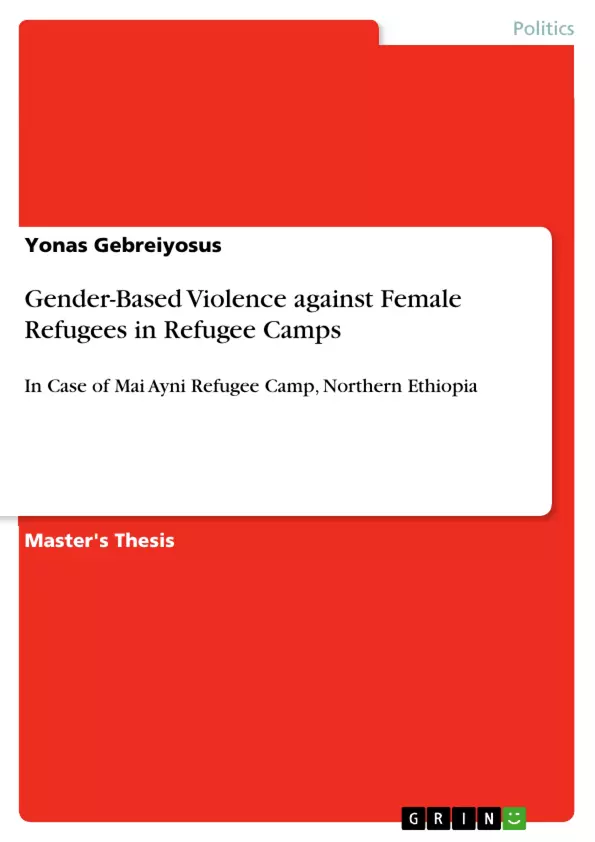Gender-based violence prevents female’s enjoyment of fundamental human rights and it is also central social, economic and health problem. Similarly, gender-based violence is viewed as a significant problem in refugee camps throughout the world. However, in Ethiopia studies on gender based violence against female refugees are limited. Most researches in this area were conducted in line with other problems of refugees. Yet, in order to assess comprehensively it needs specific study.
Thus, the main objective of the study was to examine the prevalence, cause and consequences of gender based violence against female refugees in Mai Ayni refugee camp. In order to achieve these objectives, qualitative methods of data collection have been employed. Hence, data were collected from in-depth interview with eighteen female refugees and five male refugees, focus group discussion with male and female refugees, key informant interviews with concerned bodies as well as document analysis and personal observation were used.
The study has found that female refugees in the camp were exposed to sexual violence, physical violence and socio-economic violence including; attempt rape, rape, gang rape, physical injuries, discrimination and stigmatization, , and denial of access to services. The study also disclosed that male refugees and intimate partners of female refugees were the prime gender based violence perpetrators of female refugees in Mai Ayni refugee camp.
Moreover, the study revealed that idleness, economic dependency, physical insecurity, lack of awareness, collapse of social and family structure as well as poor reporting, coordination and legal enforcement mechanisms were identified as causes/risk factors for gender based violence against female refugees in Mai Ayni refugee camp. Moreover, men’s feeling of ‘loss of power’ in the camp, which challenges male’s identity as superior to female, led male refugees to anger and makes female refugees vulnerable to different forms of gender based violence. Consequently, because of gender based violence, female refugees in the camp have short and long lasting damaging consequence on their life in terms of health, physical and psycho-social.
Inhaltsverzeichnis (Table of Contents)
- Introduction
- Gender-Based Violence against Female Refugees in International Law
- Gender-Based Violence against Female Refugees in Ethiopia
- The Mai Ayni Refugee Camp: An Overview
- Methodology and Data Collection
- Findings and Discussion
- Conclusion and Recommendations
Zielsetzung und Themenschwerpunkte (Objectives and Key Themes)
This thesis examines gender-based violence against female refugees in the Mai Ayni Refugee Camp in Northern Ethiopia. Its primary objective is to investigate the extent of the problem, understand its causes, and explore potential solutions.
- The prevalence and nature of gender-based violence against female refugees in the camp
- The factors that contribute to the vulnerability of female refugees to gender-based violence
- The impact of gender-based violence on the lives of female refugees
- The challenges and opportunities for addressing gender-based violence in refugee camps
- Recommendations for improving the protection of female refugees from gender-based violence
Zusammenfassung der Kapitel (Chapter Summaries)
- Introduction: This chapter sets the stage for the thesis, introducing the topic of gender-based violence against female refugees and highlighting its significance. It also provides an overview of the research methodology and data collection techniques used in the study.
- Gender-Based Violence against Female Refugees in International Law: This chapter explores the international legal framework surrounding gender-based violence against female refugees. It examines relevant international conventions and treaties, including the 1951 Refugee Convention and the Convention on the Elimination of All Forms of Discrimination Against Women (CEDAW). It also discusses the legal obligations of states to protect refugees from gender-based violence.
- Gender-Based Violence against Female Refugees in Ethiopia: This chapter analyzes the legal framework and policies addressing gender-based violence against female refugees in Ethiopia. It explores relevant national legislation, including the Ethiopian Constitution and the Proclamation Against Domestic Violence, as well as the country's commitments to international human rights standards. It also examines the challenges faced in effectively addressing gender-based violence against female refugees in Ethiopia.
- The Mai Ayni Refugee Camp: An Overview: This chapter provides a detailed overview of the Mai Ayni Refugee Camp, including its history, demographics, and living conditions. It explores the challenges faced by refugees in the camp, with a particular focus on the factors that contribute to the vulnerability of female refugees to gender-based violence.
- Methodology and Data Collection: This chapter outlines the research methods used in the study, including qualitative data collection techniques such as interviews and focus group discussions. It also provides details about the sampling strategy and data analysis methods employed.
- Findings and Discussion: This chapter presents the findings of the study, drawing on the data collected through interviews and focus group discussions. It analyzes the prevalence and types of gender-based violence experienced by female refugees in the Mai Ayni Refugee Camp, exploring the underlying causes, the impact of the violence on the victims, and the challenges faced in seeking protection and justice.
Schlüsselwörter (Keywords)
This study revolves around key concepts such as gender-based violence, female refugees, refugee camps, vulnerability, protection, international law, Ethiopian law, and the Mai Ayni Refugee Camp. The research delves into the complexities of addressing gender-based violence within the context of refugee displacement, exploring themes of human rights, gender equality, and the need for effective protection mechanisms for vulnerable populations.
- Quote paper
- Yonas Gebreiyosus (Author), 2013, Gender-Based Violence against Female Refugees in Refugee Camps, Munich, GRIN Verlag, https://www.grin.com/document/212288



